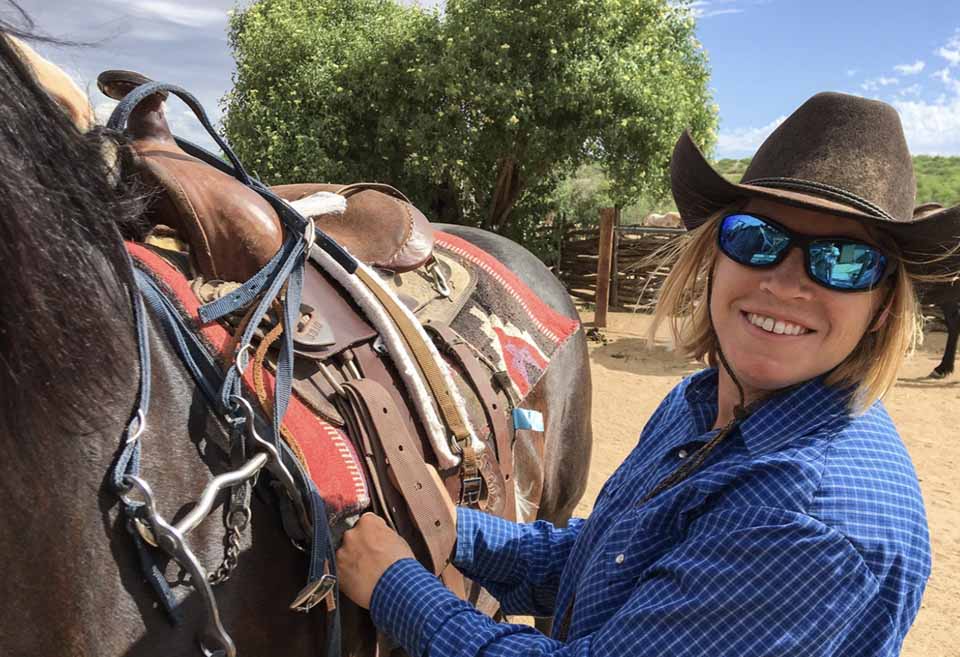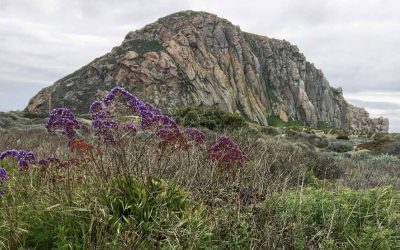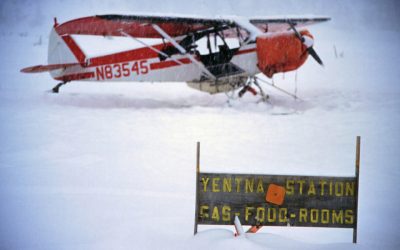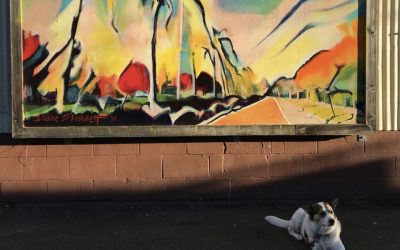It’s spring and Rancho de la Osa is in full bloom: Ocotillo, saguaro, century plants, patches of prickly pear. Buttercup sprouts from rock crevices. It’s like coming to a place I’ve never been before but somehow know. I wish I’d packed my Field Guide to North American Wildflowers.
A rider up ahead shouts, “Rattler!” The grayish reptile is stretched out on a slope near the old cemetery. My inner thighs quiver like guitar strings, though it’s not close enough to strike.
“During the latter part of the Mexican American Revolution, the hacienda doubled as a hospital,” Ross throws over his shoulder. “Many of the graves are unmarked.”
Colleen swivels in her saddle. “Soldiers from both sides.”
Riding to The Wall
Rays from the afternoon sun rebound off the steel pipes that make up “the wall”. The pipes rise 15-feet on the border between de la Osa and Mexico, sinking 12 feet into the ground. Newly installed razor wire rolls across the top of all 7 miles, like an oversized barbed slinky. A ratty backpack hangs from a coil.
Ross thumbs his walrus mustache. “If we stay here long enough we’ll probably have company.”
Sure enough, a US Border Patrol pickup idles nearby.
After our ride, I sink into an Adirondack chair and begin a poem to no one. The hacienda shimmers in pinks, corals, and peaches, reminding me of a flight of rosé. A family of owls live in a eucalyptus tree a few feet away.
I slap at the carpenter bee buzzing my head. It’s the size of a small bird and sounds like a helicopter. Then, it bumps clumsily into a wooden post.
A guest staying in the Cesar Romero Villa says, “That bee wants you to think he’s scary but he’s bluffing. Males don’t have stingers.”
Communal Meals
Lynne Knox, Ross’s wife, runs the office. She sounds the dinner bell outside the hacienda. Her belt buckle is the size of a salad plate, earned from an Extreme Cowboy Association event. “It’d sort of like navigating an obstacle course on horseback,” she says.
Chef Chase Smith sets hearty Southwest dishes on a sturdy side-table: slabs of meat, fist-sized spuds, and steamy biscuits. The to-die-for dressing on the spinach salad dances the line between sweet and savory.
Cowboy Poetry and a Horseback Breakfast
I plow through a paver-size slice of mud pie before trailing Ross to the cantina. He’s performed at well-known cowboy poetry gatherings around the country since the mid-1980s and is revered for having memorized over 100 poems, his and others.
“I’ve been writing longer than there was such a thing as ‘cowboy poetry,’ he says, stepping onto the small stage. “It was something to do when I was alone for months at a time in a horse camp.”
He tells us about the inspiration behind his poem “Memories.”
“I was just a kid, seeing the Northern Lights for the first time. Imagine that.” He’s as much of a philosopher as anything else. “’Just you, God and lights/only things left that are free/not a slave to the urban mall/being a cowboy is the highest callin’.’”
After his recitation, he sits back chatting about the bloodline of his quarter horses. “We don’t have stallions here,” he says, sipping tequila to sooth his raspy voice. “This is a dude ranch for pity sake.”
I check the activities’ list for the next morning, choosing the breakfast ride over fat-tire biking and shooting clay pigeons. The sun rises in a barrage of color that reminds me of rainbow sherbet. There’s a wisp of a salty breeze from the Sea of Cortez to the south.
I hang out at the stables loving the smell of leather and damp hay. Steers snort at us from a pen. “Remember me?” I ask Smoke, stroking his muzzle. He flicks flies lazily with his tail.
The air is crisp and the desert is an island of life. We ride single file, passing unseen gullies and picking our way over rust-colored slabs of shale and sandstone. Stephen King wrote about land like this, “Once again there was the desert and only that.” (The Gunslinger)
I appreciate what has brought us to this out of the way place: escapism, solitude, and a reverence for nature and history. I’m reminded of a time when cowboys sang by a campfire and coyotes howled back.





